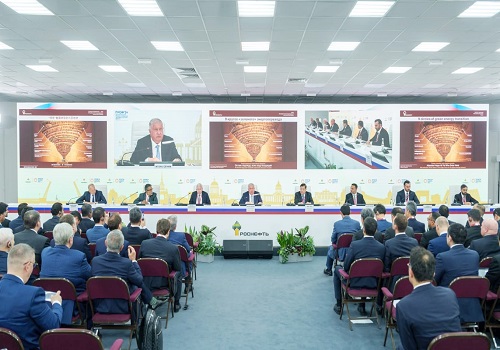Rosneft CEO Igor Sechin presents keynote speech at 2024 SPIEF Energy Panel

Rosneft CEO Igor Sechin presented the keynote speech at the 2024 SPIEF Energy Panel. Organised with the support of Rosneft oil company, the Energy panel was held during the XXVII St Petersburg International Economic Forum.
Rosneft CEO Igor Sechin presented the keynote speech titled “Energy transition and phantom barrels: Abandon hope, all ye who enter here. Not everyone will be taken to the bright future of the global energy industry!”
He presented an analysis of the current situation in the energy market, which is experiencing an imbalance.
In his speech, the head of Rosneft paid special attention to the energy transition, which, despite the efforts of its adherents, is failing.
According to him, despite about $10 trillion invested in the energy transition over the past two decades worldwide, alternative energy sources have failed to replace traditional fuels.
Currently, wind and solar power provide less than 5 per cent of the world's energy production, and electric vehicles account for about 3 per cent.
Over the same period of time, oil, gas and coal consumption grew by a cumulative 35 per cent, while their combined share of the global energy mix remained unchanged.
Huge investments made over the past decades in the development of alternative energy sources have not led to the displacement of fossil fuels from the energy market, and the green transition strategy in its current form cannot ensure the sufficiency, availability and reliability of energy sources, Igor Sechin emphasised.
The Rosneft chief also noted the need to find new opportunities and ways to develop the global energy sector within the framework of a multipolar world.
Developed countries have made the greatest contribution to the climate crisis, accounting for the majority of emissions, he added.
Citing data from the UN and non-governmental research institutes, Igor Sechin said that developed countries account for 65 per cent of the cumulative emissions produced over the last 200 years, while the world's 10 per cent wealthiest population is responsible for half of all carbon dioxide (CO2) emissions.
Meanwhile, the richest 1 per cent of the world's population accounts for twice as much carbon dioxide emissions as the poorest 50 per cent, and the entire continent of Africa produces less than 4 per cent of the world's emissions.
Further, Igor Sechin underlined that the energy transition should be well-balanced and focused on addressing the interests of the majority that will ensure the growth of energy consumption in the coming years, that is, developing countries.
He also noted that to achieve energy security, it is necessary to ensure the sufficiency, affordability and reliability of energy sources.
Aggressive promotion of the "green agenda" actually means declaring an energy war on the majority of the world's population, and overcoming energy inequality is impossible without reliable supplies of oil and gas, said the Rosneft CEO.
He noted that the developing countries in Asia and Africa, which are yet to overcome energy poverty, will drive the demand for electricity.
By 2030, demand growth in developing countries is expected to account for 95 per cent of global consumption growth in aggregate, due to a high population growth in these countries.
In such a scenario, a reduction in global consumption of fossil resources would automatically mean that the problem of hunger and energy poverty would not only persist but also worsen.
On one hand, giving up oil will mean giving up the modern way of life, on the other hand, for many countries, increased oil consumption means access to the benefits of civilisation, Igor Sechin said.
He added that the highest growth in oil demand is expected in Asian countries, which are Russia's main trading partners.
India's economy has made significant strides in recent years. Since 2010, energy demand has grown by 45 per cent, making the country the third largest energy consumer in the world.
Over the next five years, India is projected to continue its strong economic momentum and become one of the top three largest economies in the world with a GDP of $5 trillion, and by 2050 will overtake the US in terms of the size of the economy.
India's end-use energy consumption is set to grow by 90 per cent by 2050 -- one of the fastest growth rates in the world.
Despite the increasing pressure from sanctions, Russia is retaining its role as one of the leaders in the global energy sector.
Taking into account the influencing factors, Russia continues to realise its energy development potential and strengthen its position in the global energy market.
Recently, the President of the Russian Federation Vladimir Putin emphasised the importance of reorienting Russian exports to the fast-growing markets of the Asia-Pacific region.
Igor Sechin reminded that the turnaround of Russian energy exports to Asia-Pacific markets began with the construction of the ESPO pipeline (the Eastern Siberia – Pacific Ocean pipelines) and investments in India's oil and gas sector long before the European markets were closed to Russia.
Currently, the Asia-Pacific region accounts for more than 80 per cent of Russian oil exports, and it is already evident that the reorientation of supplies has fully justified itself, Igor Sechin said.
Now that the failure of the "green transition" concept is evident, we have to develop a new strategy for a reliable and secure energy supply tailored to the needs of developing countries, the Rosneft CEO said.
























